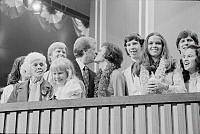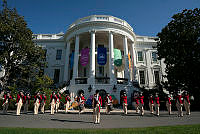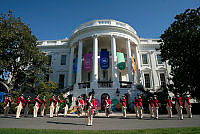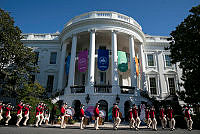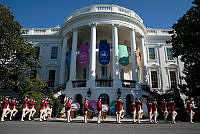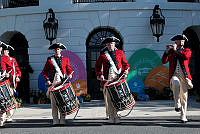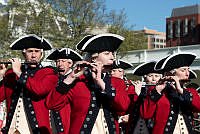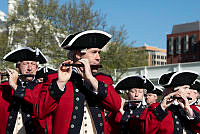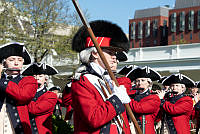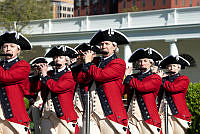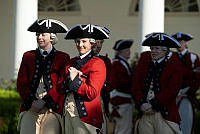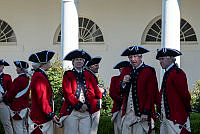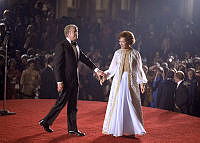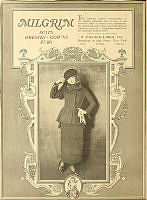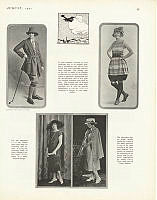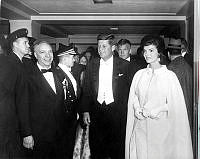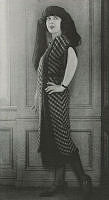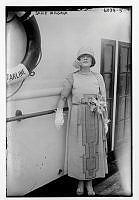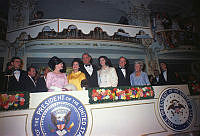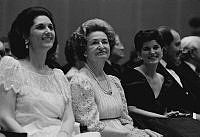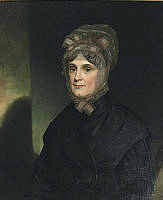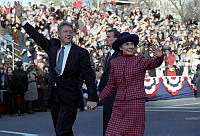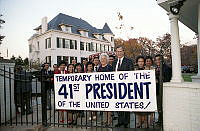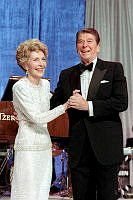Benjamin Brown French in the Lincoln Period
Copyright © White House Historical Association. All rights reserved under international copyright conventions. No part of this article may be reproduced or utilized in any form or by any means, electronic or mechanical, including photocopying, recording, or by any information storage and retrieval system, without permission in writing from the publisher. Requests for reprint permissions should be addressed to books@whha.org
Benjamin Brown French first arrived in Washington City in December 1833 and went to work for the House of Representatives. A native of Chester, New Hampshire, he had read law, run a newspaper, served briefly in the state militia where he acquired his familiar title “Major,” and as a Jacksonian Democrat served a term in the lower house of the New Hampshire legislature. He was 33 years old when he commenced a career in Washington as an inveterate federal officeholder, advancing most prominently from assistant clerk to the clerk of the House, 1845 to 1847, to commissioner of public buildings under Presidents Franklin Pierce, Abraham Lincoln, and Andrew Johnson. Thus situated, French acquired unique access to those who walked the halls of the Capitol as well as many inhabitants of the White House. He was close to 12 administrations, from Andrew Jackson to Ulysses Grant. With his home only a block from the Capitol, French became an ever-present figure in Washington’s political, business, and social worlds. And though he never wielded great power, he was in a position to know and observe those who did. In fact, it is through the journal he kept that Benjamin French left his most lasting mark, with remarkable observations and commentaries beginning in 1828 and continuing until his death in 1870. One of the highlights of his literary remains is his unusual and intimate account of Abraham Lincoln’s White House.
French, a tireless chronicler, maintained an 11-volume journal, which is the centerpiece of the Benjamin B. French Family Papers in the Manuscript Division of the Library of Congress. Written in a bold and open hand, the journal is replete with pithy observations on politics, public figures, significant events, social and cultural affairs, and family and personal matters. It has been available to scholars since 1970, and a praiseworthy edited version was published in 1989.1 Additional correspondence of Benjamin French, his older son Francis “Frank” O. French, and other family members was acquired in 1991 and richly complements the journal and other items in the collection. Also recently added to the French Family Papers are the boyhood journals of Francis French, which provide a unique view of a young boy from a well-to-do family growing up in antebellum Washington. This new material has recently been arranged and described and is now available to researchers.
As the year 1860 opened, Benjamin French was casting about in earnest for a new government position. Although he had not held a government job in five years, he felt his prospects were good, especially if the Republican presidential candidate were elected in November. His employment for 14 years in the House of Representatives had been his due “spoils” as a Democrat. A Whig Congress turned him out in 1847. In 1853 his old friend and fellow New Hampshire Democrat, Franklin Pierce, rewarded French for his support in the presidential election of 1852 by appointing him commissioner of public buildings. But in 1855 President Pierce, informed of French’s fleeting association with the nativist Know-Nothing Party, forced French’s resignation. In fact, the fatal flirtation was symptomatic of French’s dissatisfaction with the Democratic Party and his increasing doubts about slavery and its divisive effects. By the end of the decade, French had completed his political transformation and was firmly allied to the new Republican Party, considering himself “an ultra Union man.”2 After his dismissal from government office, French put his familiarity with government to work by serving as an agent pressing private claims against the government, an enterprise he found wholly unsatisfactory. Accordingly, he was elated when finally, in July 1860, he was selected for the salaried position of clerk of the Committee of Claims in the House of Representatives. Although the job was less prestigious than he felt his due, French nonetheless saw it as an harbinger of good fortune and wrote excitedly to his wife, Elizabeth: “My pay as Clerk will begin to run next week, and I think on $1,800 [per annum] and what I shall receive outside, we can live till ‘Old Abe’ gets in and then look out!”3
French rejoiced in Abraham Lincoln’s election in November and at the same time recoiled at the South’s threat of secession. That same week he learned that his beloved wife Elizabeth had been diagnosed with breast cancer and had consented to a mastectomy.4 These events set in motion probably the darkest period in French’s life: within six months the nation would be split asunder, and his wife of 36 years would be dead. French shouldered his burdens and soldiered on, serving as chief marshal for Lincoln’s inauguration, participating in the wedding of his older son, Frank, while skillfully positioning himself for appointment to a better office in the new administration.
Elizabeth’s death in May was a profound loss for French. His family gathered round him to assuage his grief. Mary Ellen Brady, a sister of his brother Edmund’s wife, moved in to manage his household. With time, a romantic attachment developed between Mary Ellen—30 years younger—and French, and within a year and a half they were wed. For French, however, the personal tragedy of the illness and passing of Elizabeth fatefully marked the beginning of his association with the Lincolns.
In late February 1861, Major French and others involved in preparations for the inauguration called on the president-elect to welcome him to the “federal metropolis.” After “considerable conversation,” he was pleased with the president’s “offhand, unassuming manner” and declared that Lincoln would be a “first-rate President.”5 Aspiring to the office of marshal for the District of Columbia, French met again with the president on April 12 to press his case. Lincoln assured French that he had him in mind for one of two unspecified positions. They had a “cosey [sic] chat,” and the president seemed pleased with French’s advice in response to various questions he posed.6
French continued to pursue the president for a position throughout the spring and summer. Within two weeks of his wife’s death he visited the President’s House again, and on July 4 he composed and sent to the first lady about 30 lines of poetry, which closed with the stanza:
So Washington’s and
Lincoln’s names
Twined in a wreath shall be,
One gave a Nation to the
World,
The Other keeps it free.7
Always careful to maintain high public visibility, French regularly attended public occasions and dutifully recorded them in his journal. His descriptions capture moments great and small, and the diarist seldom hesitates in making historical or poetic analogies. French was at the White House on June 29, 1861, when the president and a full complement of cabinet members and other public officials were gathered on the south grounds to hear speeches and ceremoniously raise the flag atop a large tent. When the president took the rope and began to hoist the flag through a hole in the top of the tent, it quickly became apparent that the aperture was not large enough to allow the flag easy egress. In a passage suggestive of the president’s physical strength, French wrote:
The President then took hold of the halliards & commenced raising the flag. At the place where the cloth surrounded the pole it hung hard, but the President tugged away with a will, and up it went, but, alas, when it blew out in the breeze the two upper stripes and about three of the stars were separated by a rent, and just hung like a ribbon to the rest of the flag. Although a thousand hearty cheers went up, and the band played “the star spangled banner,” and the guns of the Artillery, stationed on the Monument grounds, thundered a salute, I felt a sorrow that I cannot describe, at seeing the torn flag. It seemed to me an omen of ill luck. My only consolation was observing the determined energy with which the President pulled away at the halliards—as if he said, in his mind, “It has got to go up whether or no.” And I thought, “Well, let what reverses may come, he will meet them with the same energy, and bring us out of the war, if with a tattered flag, still it will all be there!”8
Rumors began circulating in August that Lincoln would reappoint Major French commissioner of public buildings, and on August 10, French metwith the President and Mary Lincoln, who informed him he would indeed receive the commission in early September.9 Lincoln explained, however, that the appointment would not be official until the current commissioner, William Wood, was given an opportunity to resign. Wood, who had fallen out of favor with Mrs. Lincoln, had been serving on a temporary basis because his commission had not been confirmed by the Senate.10 French was buoyed by the meeting and wrote to Frank, “I have the vanity to believe that Mrs. L. and I rather cottoned to each other.” But after explaining the president’s delay in granting the appointment, he impatiently added, “That is the program, now we shall see whether it will be carried out. Having lost all confidence in princes, I do not expect it will and hardly care whether it is or not.”11
Still fidgeting over the lack of a formal appointment, French appeared again at the White House on September 3 and approached the president just after he alighted from his carriage. Lincoln greeted him heartily and, covered with dust and walking with “that peculiar swinging gait that characterizes the old ‘Rail Splitter,’” escorted Major French to his office. After they were seated, French immediately queried the president on the status of his appointment. Lincoln “looked up with his peculiar smile and eyetwinkle and said ‘the fifth, Mr. French, the fifth; you understand!’ And then he laughed.” French replied, “Yes Mr. President, I do understand, and no more need be said on that subject.”12
French assumed his commission with no illusions. “I knew the firebrand I was taking up, & supposed it would burn me; so if I get scorched it is no more than I anticipated.”13 He was charged with taking care of the Capitol, the President’s House, and Washington’s avenues, public squares, reservations, and bridges; administering the Capitol police and watchmen; and disbursing the money appropriated for the public works and property. Additionally he would soon be appointed the disbursing agent for the Capitol extension and the new dome. He was also saddled with the appointments of his predecessor. 14
French’s duties at the Executive Mansion fostered a close working relationship with and familiar access to the president and Mrs. Lincoln. The commissioner’s position was unique. His initial impressions of the Lincolns were favorable, but it soon became clear in French’s journal and letters that his encounters with Mary Lincoln exposed her uneven and mercurial temperament. In September 1861, he cautiously wrote, “I hope and trust she & I shall get along quietly. . . . She is evidently a smart, intelligent woman, & likes to have her own way pretty much. I was delighted with her independence and ladylike reception of me.”15 But a few weeks later he complained in a letter to his brother, Henry Flagg French, about the “interviews I have with the ‘Republican Queen’— who plagues me half to death with wants with which it is impossible to comply, for she has an eye to the dollars!” In contrast, he seemed to imply in the same letter that he was settling into a comfortable relationship with “honest old Abe, who calls me ‘French’ and always tells me a story when I go to talk with him.”16 Lincoln appeared to enjoy French’s company and sometimes took him into his confidence with the admonition not to “let on.”17 In particular they often discussed the progress of the war and military matters. French’s affection for the new president seemed only to grow stronger.
By French’s own admission, one of the more onerous of his duties was the first lady’s requirement that he attend all her receptions as announcer. He found these routine events with the long receiving lines a bore and was uncomfortable with what he perceived as Mary Lincoln’s insincere affectations toward the guests. On the other hand, he delighted in attending dinners and performances at the President’s House. He once apologized to his son for a twice-told tale, but “a dinner with the Pres. is worth telling twice.”18 And on another occasion he exuberantly wrote, “The President looked natural & easy. He is Old Abe, & nothing else, place him where you will. Everybody that knows him loves him, I believe. Mrs. L. looked remarkably well & would be taken for a young lady at a short distance. She is not very old, say 40 to 45. She seemed much at her ease, & strove to be agreeable & was so.”19
Financial woes at the President’s House surfaced early. French learned that his predecessor had overrun the appropriation for maintaining the house, and he was alarmed to discover Mary Lincoln’s extravagance in refurnishing the mansion. Prudently defending his position in the matter, French wrote, “Whatever investigation may be made regarding Mrs. Lincoln’s extravagance cannot in any way affect me. The appropriation for refurnishing . . . was expended under the authority, de jure, of the President. . . . All the extravagance in the repairs was committed before I came into office, and I have not paid for them.”20 In December 1861, with bills piling up, the first lady tearfully confided in Major French her fear at approaching the president regarding her spending habits. She pleaded with him to intercede on her behalf without lettingthe president know she had spoken with him. French’s now famous interview with Lincoln was a disaster. Lincoln quickly ascertained that Mrs. Lincoln was the source of the excessive expenditures and angrily “swore he would never approve the bills for flub dubs for that damned old house!” He said, “It would stink in the land to have it said that an appropriation of $20,000 for furnishing the house had been overrun by the President when poor soldiers could not have blankets.” French eventually devised a discreet method of paying the bills with other expenditures.21 Despite this episode, French did not despair about the first lady, declaring that he would “defend her” and that she was “more sinned against than sinning.”22
The new year dawned auspiciously for Major French. The president’s New Year’s reception was a success, and on January 27 French learned that his commission had been unanimously approved by the Senate. Positive reports about the progress of Union forces imbued him with a sense of optimism as he began preparations for the illumination of public buildings on February 22, Washington’s birthday. Privately he had constructed a canvas transparency more than 100 feet long with letters three feet high spelling out the 23rd verse of the 118th Psalm—“This is the Lord’s doing; it is marvelous in our eyes”—which he planned to hang over the stone balustrade of the Library of Congress (west portico of the Capitol) and illuminate with gas as part of the celebration.23
The death of the Lincolns’ second son, Willie, on February 20, forced the cancellation of the grand illumination and shattered whatever complacency there may have been in the wartime White House. Mary Lincoln was inconsolable. French took charge of the funeral arrangements, and after inspecting the preparations on the morning of the funeral, he wrote: “I found everything properly arranged. . . . The body of little Willie lay in the green room, in the lower shell of a metallic coffin, clothed in the habiliments of life, and covered with beautiful flowers. After looking about the house for a while I walked up into the President’s office and read. He came up after I had been there about half an hour and appeared quite calm and composed. He talked about his family and about the war.”24 Around midday the president, Mrs. Lincoln, and their oldest son, Robert, secluded themselves with the body for a half hour, apparently unaware that a horrible storm had blown up. “The heavens were rolling in clouds, while the tin roofs were rolling in all sorts of shapes. . . . One church was demolished by the falling of the immense steeple. . . . It was a master gust!”25
In the ensuing months French’s relations with Mary Lincoln became increasingly circumspect, reflecting the effect the death had had on her. He wrote to his brother Henry: “Mrs. Lincoln is—Mrs. Lincoln and nobody else, and like no other human being I ever saw. She is not easy to get along with, though I succeed pretty well with her. If I ever see you again, I will amuse you with yesterday’s experience. I dare not put it on paper—even to you.”26 One day in May the first lady arrived at French’s home in her carriage. He walked out and had “quite a talk” with her about matters at the President’s House, including “a thing not to be talked about.” On leaving, she handed him an “elegant bouquet.”27 Unfortunately French never reveals that which cannot be written.
On the other hand, French’s respect and admiration for “Old Abe” grew, and he spoke frequently of Lincoln’s honesty, honor, and openness. He was completely disarmed by Lincoln’s lack of pretension in one vignette that he related to his sister: I saw honest old Abraham yesterday—while present, with a room full of visitors, he was writing a note on a card held on his knee he sung out “How d’ye spell missill’—meaning ‘missile’—I don’t know how to spell it.” I answered, and he spelt it as I told him. Is there another man in this whole union who, being President, would have done that? It shows his perfect honesty and simplicity, & that he is truly a great man.28
But in February 1863, after a meeting with the president, French wrote ominously of the signs of strain on the president and described him as “growing feeble” and with a hand that “trembled as I never saw it before.” French told him that he should get some rest, and the president replied that “it was a pretty hard life.”29
The dedication of the Gettysburg cemetery in November 1863 was a signal event in French’s life, and he devoted several pages in his journal recounting the occasion. He served as an aide to the marshal-in-chief and sat on the speaker’s platform with the other invited dignitaries. After Edward Everett’s oration, the Baltimore Glee Club sang a “Consecration Hymn” that had been composed by French for the occasion after several prominent poets had declined the honor.30 Lincoln’s brief address and the “hurricane of applause” that followed inspired Major French to write: “Abraham Lincoln is the idol of the American people at this moment.”31
As commissioner of public buildings, French was responsible for the day-to-day maintenance and repair of the White House and other public structures in his charge. Typical requests for congressional appropriations included funds for wood and coal to heat the mansion or paint supplies to brighten dingy walls or fences. French directed the rebuilding of the fences on the south grounds when they were damaged by cavalry troops during drills, and he was involved in the construction of a new White House stable after fire destroyed the original building. An inspection of the mansion in March 1864 by French and members of the Committee on Public Buildings of the House of Representatives revealed that the basement was infested with rats. They had damaged the woodwork, and the smell of dead rats had permeated several upstairs rooms. Subsequently French requested funding to remedy the situation.32 Throughout his tenure in the Lincoln administration he proposed that Congress provide for a day watchman in the public rooms to protect them against pilfering and other damages caused by the errant conduct of visitors. Each year he had been denied, and his final request as Lincoln’s commissioner in early 1865 met the same fate. In fact, no appropriation for public buildings was approved by Congress that spring. Lincoln advised a distressed French that “we must pick along in some way.”33
A serious disruption in French’s relations with Lincoln occurred in early 1864 when French attempted to have his office removed from the supervision of the Secretary of Interior John P. Usher. Although the commissioner of public buildings was appointed by the president, the incumbent served under the secretary. For various reasons, including having been unceremoniously removed by the secretary as disbursing agent for the Capitol extension and the new dome with a commensurate reduction in salary, French had developed an intense dislike for Usher. After consulting with friends in Congress, he had crafted a bill to establish his office independent of the secretary, and Senator Solomon Foot had introduced it in Congress. When Usher complained to Lincoln, the president wrote a curt letter to French saying: “If the change is made, I do not think I can allow you to retain the office; because that would be encouraging officers to be constantly intriguing, to the detriment of the public interest, in order to profit themselves.”34 Two days later French sent Lincoln a long letter explaining his actions and assuring the president of his loyalty. 35 But he was far less conciliatory about the issue in letters to his son Frank and a sister-in-law, boldly threatening that should he be removed “we shall see some unexpected developments,”36 and that “there is an inside as well as an outside to most things, and watches and some other delicate movements become injured at much exposure! Abraham is not a fool.”37 But realizing that the president had called his bluff, French relented. After meeting with the president and with support from Senator Foot, French was able to retain his office and Lincoln’s confidence. The bill did not pass.38
Throughout all the foregoing, the war dragged on as an omnipresent and threatening backdrop, and French wrote frequently of its effects in Washington. Often the president would discuss military matters and the progress of the war with French, who felt he had some acquaintance with strategy from his brief military service. The approach of Confederate troops under Jubal Early to the outskirts of Washington in July 1864 was particularly vexing to French. In the face of this threat, French wrote that Lincoln appeared to be detached and lackadaisical, not treating it with “sufficient seriousness.”39 A few weeks after the crisis had passed, French stopped in briefly to talk with the president while the barber was shaving him. While speaking about the progress of the war, Lincoln stopped the barber for a moment, looked up at French, and told him that “we must be patient, all would come out right.”40
The capture of Richmond in early April 1865 brought a delirium of joy to Washington. “All Washington went mad for a season,” French wrote, “and we ran about the streets, and everybody shook hands with everybody else . . . for Washington was drunk.”41 Ordered to illuminate the public buildings in victory celebration, French unpacked the large banner he had prepared three years earlier and unfurled it over the entire length of the western portico of the Capitol. And when it was lighted with gas, he declared the flag a “marked feature,” which could be read far up Pennsylvania Avenue.42 In the victorious and festive atmosphere of the day, Major French and wife Mary Ellen joined a group of congressmen and other public officials who journeyed by boat to fallen Richmond for a tour. One stop was the abandoned presidential mansion of Jefferson Davis. In the parlor French requested that a rendition of “Yankee Doodle” be played on Mrs. Davis’s piano. When an illness in the party cut the tour short, the Frenches returned to Washington on April 14 and, weary from travel, walked into their Capitol Hill home at 8:00 p.m. that evening.43
The next morning French woke at his usual time, just before dawn, and was confused to see the streetlights—normally extinguished by 3:00 a.m.—still burning outside his window. Alarmed further to find a sentinel posted in front of his house, French ran to the front door, where a passing soldier informed him that Lincoln had been shot. He dressed immediately and, pocketing a loaded pistol, hurried to the Capitol and ordered it closed and locked up. He then rushed to the home on Tenth Street where the president lay mortally wounded. The commissioner scarcely recognized Lincoln due to his badly swollen face and knew from the labored breathing that he would not survive. French later starkly recorded 7:22 a.m. as the time of death. After a few minutes he moved to the next room to console Mrs. Lincoln, who reached up from the sofa and grasped his hand “and wrung it in an agony of grief.” At her request, he took the president’s carriage and retrieved Mary Welles, wife of Navy Secretary Gideon Welles, from her home and brought her to the White House. Later that morning, French watched as the president’s remains were carried into the mansion and removed, “all limp and warm,” from the temporary coffin for funereal preparations. He spent more time with a grieving Mrs. Lincoln, then emerged and directed that the mansion be draped in mourning and prepared for the occasion. Then, feeling ill, he went home and lay in bed the entire afternoon.44
For Major French the week following the assassination was one of “labor and excitement.” “I was with the Presi-dent’s remains most of the time,” he wrote to his son Frank, “and felt responsible for many of the arrangements, although the Heads of Departments took upon themselves the burden of the business. . . . We all worked kindly together, and I can not see how anything ‘from a to izzard’ could have been arranged better.” After the funeral services at the White House on April 19, the president’s remains were borne to the Capitol, which French had also directed be draped in mourning. The pallbearers placed the president’s casket in the center of the rotunda on a catafalque designed and built by French’s younger son, Ben. There Lincoln rested, under the magnificent white dome that he had seen through to completion despite the strife of civil war.45
French’s journal is relatively quiet for the next few months. On May 7 he wrote that he had “no heart to journalize now.”46 However, in a striking letter to his son Frank, French relates an unusual incident that he, in retrospect, was convinced was an aborted attempt on Lincoln’s life at his second inaugural on March 4. French had been in the Capitol rotunda that day with members of his Capitol police when the president’s procession came through on its way to the east portico. Just as the president passed, a man “jumped” from the crowd and was restrained by a policeman. A struggle ensued, and French intervened to assist in removing the intruder. When the man angrily asserted his right to be there, French cautiously considered that he may have been a new member of Congress unfamiliar to him and released him. By then the president had exited the rotunda. French had not thought of the incident again until a few days after the assassination when someone informed him that John Wilkes Booth was present at the inaugural. When shown a photograph of Booth, French instantly recognized the face as that of the man he had struggled with in the rotunda. “He gave me such a fiendish stare while I was pushing him back, that I took particular notice of him & fixed his face in my mind.”47 French was so certain that he had helped thwart an assassination that he later took credit for saving Lincoln’s life in a statement defending himself from attacks by Radical Republicans.48
Mary Lincoln’s final days in the President’s House were marked by grief and also confusion. While she remained secluded in her room, poorly supervised staff and servants upstairs prepared her belongings for shipment, and tourists scoured the state rooms below for souvenirs. When the press began reporting items missing from the White House, including supposedly large amounts of silver and china, Mrs. Lincoln laid the blame on French.49 French later denied any involvement with the missing items in testimony before a congressional investigating committee.50 On the day before Mary Lincoln left Washington, French wrote to a sister-in-law: “I think the tragic death of her husband had made her crazier than she used to be—but the most unaccountable thing she ever did was to purchase about a thousand dollars worth of mourning goods the month before Mr. Lincoln died. What do you suppose possessed her to do it? . . . I will someday tell you what I have gone through since Mr. L’s death. I cannot write it.”51
Major French remained faithful to the fallen president. “I feel . . . I have lost a warm personal friend, whom I have looked up to almost as a father.”52 On the Fourth of July that summer, French was characteristically patriotic, yet at the same time understandably sullen. He recorded in his journal the “uproar of the guns, pistols, crackers” that lasted all day. But as for himself, he wrote: “I commenced the day by discharging out of the chamber window the five loads which I had put into my revolver on the day the President died. After that I was silent.” 53
French served as commissioner of public buildings for two more years, until his position was abolished by the Radical Republicans in retaliation for his support of Andrew Johnson. In his final years he took a minor clerk position in the Treasury Department, and though he found the work humiliating he held the post until forced by politics to resign two months before his death. He took great comfort in his large extended family in those last years and especially delighted in the presence in his home of his wife’s orphaned half-sister, Sarita Brady, who joined them in 1866.
The Major died at home at 12:54 a.m., August 12, 1870, from heart failure and lung congestion. The undertaker prepared the body and kept it on ice until the day of the funeral. At noon on that day Major French was placed in a coffin in the front parlor beneath his portrait and in front of two little lamps. His Masonic hat, badge, and sword were on the lid of the coffin and the room was strewn with flowers. Sarita Brady wrote that her “dearest recollection will be the perfect look of rest he wore. . . . The last time we assembled in the parlor was for . . . a wedding. One of the hardest things was to remember that occasion, and then to see Major, who was so active and interested then, being carried out.”54 The funeral services lasted into the early evening. The Major then was taken to Congressional Cemetery, where he was laid to rest amid throngs of mourners in the glow of Masonic torches.55
The full account of Benjamin B. French’s life is not defined by his government service alone. A gregarious and open man, he was likewise immersed in numerous community and business activities, including treasurer of the United States Agricultural Society, grand master of the Knights Templar of the United States, and president of the Republican Association of the City of Washington. He invested smartly, and his business acumen provided him a better lifestyle than would otherwise have been possible on a government salary. Recognizing the value and profitability of technology, he invested in the Magnetic Telegraphic Company, and in the late 1840s he served as president of the organization. He was also interested in cultural and literary matters, constantly composing poetry, speaking at public occasions, and discussing current authors and their works in his correspondence. His journal is filled with descriptions of parties and other social occasions, and it was not uncommon to find him at home playing euchre well into the night with a group of cronies that included congressmen and other prominent public officials.
Most important was his immediate and extended family and the social network it provided. He was devoted to his wives. His older son Frank, who became a successful international banker, was a great source of pride for him. And although his younger son Ben was somewhat of a ne’er-dowell and a prodigal causing him much grief, the Major never forsook him. Interestingly, he lived long enough to remark on the nascent talent for sculpture evinced by his young nephew Daniel Chester French,56 who would later create the monumental sculpture of Lincoln for the Memorial in Washington.
Benjamin Brown French would be little remembered today were it not for his journal and letters. They provide a wide window onto the early years of the republic and more particularly on the Lincoln White House, and are his legacy to the nation.


